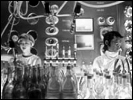Stereo Future
- Year
- 2001
- Original title
- Stereo Future SF Episode 2002
- Director
- Cast
- Running time
- 111 minutes
- Published
- 7 March 2002



by Andrew Cunningham
There are three kinds of directors. Those who make crap, those who make crap into gold, and those who are completely brilliant and yet never seem to make anything but crap despite this. I had almost written off Nakano Hiroyuki as category three, but it seems he has simply been working in the wrong genre.
Stereo Future isn't really a sequel to Samurai Fiction, but merely another film made by him with a title that abbreviates to SF. I applaud such creative interpretation of the sequel concept. Samurai Fiction, and his attempt at a home-grown event film, Red Shadow, were both action films that disintegrated under Nakano's somewhat arbitrary sense of dramatic pacing. As Wong Kar-wai has proven several times now, if you really want to make a movie like a patchwork quilt, throwing in ideas on a seemed-like-a-good-idea-at-the-time basis, then you need a good romance. I'm not sure if this is designed to simulate the altered perceptions of the world that love and heartbreak bring, but we as an audience seem to be much more willing to accept what amounts to structural nonsense in stories that accurately manage to channel those feelings.
Stereo Future is about a man (played by Masatoshi Nagase), an actor busy bungling his big break into movies, and a woman (Akiko Monou) who has ceased to talk. This creates a little confusion early on, since the story of her silence starts before we get to the bit in his story where he broke up with her. Normally, this sort of thing makes me fret and try and figure out if the film has done that Hong Kong period-piece trick of casting indistinguishable actresses in all the key roles, but here the train ride through the woods that plays through the opening credits has relaxed us enough that we're content to sit and wait for things to fall into place. Presumably, together, they are stereo, and the future is a hypothetical time when they won't be mono anymore.
Nagase has been hand picked for a key role in a terrible chambara movie by that film's lead actress. The director is clearly insane; his star (Naoto Takenaka in another tailor-made role) a hideous ham; and Nagase is far too good an actor to ever fit in here. Monou is followed around by an American botanist who seems to be quite a charmer. Daniel Ezralow can actually act, unlike so many foreigners in Asian movies; it's just that I don't trust him. He frequently comes across as merely slimy and fake. Still, I was willing to discard this feeling and accept his function in the film - both his botanist and Nagase's fellow actress are intended to seem like perfectly great alternatives that ultimately just can't hold up to true stereo. (There's a minor subplot about some knockoff speakers as well; this is the sort of movie that lends itself to concocting elaborate and yet meaningless theories.) This structure allows Nakano to deliver a number of hilarious and exciting action set pieces, preach a bit about environmental safety, and occasionally slide in totally weird things like the oxygen bar, all without ever making us wonder where the hell he's going with all this.
I'm convinced the true beauty of movies like Stereo Future is the way they seem to mean a lot without actually doing so. This is perhaps the true value of love - it has no lasting beneficial impact on anyone but ourselves, and yet without it our lives would not be worth living.